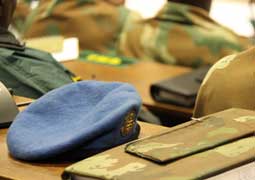
Parliament, Wednesday, 26 August 2020 – The Portfolio Committee on Defence and Military Veterans today conducted a workshop with the South African National Defence Force (SANDF) to get an in-depth understanding of the challenges relating to the SANDF’s human resource structure and force rejuvenation plans.
The workshop took place following the committee’s concern over the continuous annual budget shortfall of around R3 billion towards the compensation of employees. The workshop exposed the impact of the shortfall on the mandate of the SANDF, its implications on the country’s defence system, and its impact on the ageing top-heavy structure of the Defence Force.
Following the SANDF’s presentations, Chairperson of the committee, Mr Cyril Xaba, told the SANDF that the compensation of employees competes with other programmes, and the current expenditure patterns leave limited funds available for operations and capital acquisition, and that could weaken the capabilities of the military. The SANDF, he said, continues to state its intentions of addressing the matter without applying timelines to these plans.
One of the force rejuvenation approaches highlighted by the SANDF during the workshop was the creation of opportunities of appointment in other government departments, but the committee is of the view that this is not an effective plan since the government is compelled to reduce the wage bill.
While the rejuvenation strategy aims to change the human resource profile of the SANDF without compromising the force’s capability to plan, prepare and conduct military operations, National Treasury’s Budget and Policy Analyst, Dr Rendani Randela, has confirmed that the rejuvenation plan in its current form will not resolve the challenges faced by the department.
The committee is concerned that the large number of trainees recruited under the Military Skills Development System (MSDS) are not absorbed into the force, but go back into the poverty-stricken communities, and unemployment could result in them using the acquired skills for nefarious reasons.
The Deputy Chairperson of the Defence Force Service Commission, Ms Sebina Hlapolosa, told the committee that the MSDS has a direct relationship with the rejuvenation of the force, she said, unless there is a room for the trainees to be absorbed, the rejuvenation of the Defence Force is unlikely to happen.
Confirming the view that the SANDF has a top-heavy structure, Ms Hlapolosa told the committee that the SANDF, in its current form, has more Generals than the South African Police Services (SAPS) which has a permanent structure which is bigger than the SANDF. She said this reinforces the need to review the current structure.
Mr Xaba said that the challenges in the SANDF should not be allowed to escalate to a point where the operational readiness of the force is affected. “You cannot be an army with no equipment, and the cost of your employees cannot overshadow the maintenance of prime mission equipment,” he said.
The committee has instructed the SANDF to develop, and present to it within the next month, an action plan with clear timeframes to address the challenges of the compensation of employment and the force rejuvenation strategy. Furthermore, the committee told the SANDF to address the issues related to the exit mechanism which at this point has no official status. The committee also resolved to engage the Military Command Council (MCC), in particular, the Chief of the SANDF on the force design of the SANDF.
ISSUED BY THE PARLIAMENTARY COMMUNICATION SERVICES ON BEHALF OF THE CHAIRPERSON OF THE PORTFOLIO COMMITTEE ON DEFENCE AND MILITARY VETERANS, MR CYRIL XABA.
For media enquiries or interviews with the Chairperson, please contact the Committee’s Media Officer:
Name: Felicia Lombard
Parliamentary Communication Services
Tel: 021 403 8285
Cell: 063 503 2364
E-mail: flombard@parliament.gov.za

